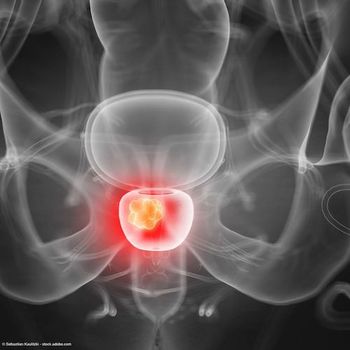
Prostate cancer trial starts treatment with novel PSMA theranostic 64/67Cu SAR-bisPSMA
The theranostic 64/67Cu SAR-bisPSMA combines the PSMA PET imaging product 64Cu-SAR-bisPSMA and the PSMA targeted therapy 67Cu-SAR-bisPSMA.
The first US patient has been treated in the phase 1/2 SECURE trial examining the novel PSMA theranostic 64/67Cu SAR-bisPSMA in patients with metastatic castration-resistant prostate cancer (mCRPC), according to Clarity Pharmaceuticals, the company developing the treatment.1
The patient received the novel radiopharmaceutical therapy at the Urology Cancer Center and GU Research Network in Omaha, Nebraska.
"64/67CuSAR-bisPSMA products hold great promise of improving prostate cancer diagnosis and treatment and have the potential to provide significant supply benefits in comparison to current products in the market. We look forward to working together with Clarity to explore these benefits and utilize them to improve the lives of men with this insidious disease," Luke Nordquist, MD, urologic medical oncologist at the Urology Cancer Center and GU Research Network in Omaha, Nebraska, who treated the patient, stated in a press release.
The theranostic 64/67Cu SAR-bisPSMA combines the PSMA PET imaging product 64Cu-SAR-bisPSMA and the PSMA targeted therapy 67Cu-SAR-bisPSMA. In the open-label, single-arm, dose-escalation SECURE trial (NCT04868604), 64Cu-SAR-bisPSMA will be used for the selection of appropriate patients to receive treatment with 67Cu-SAR-bis-PSMA. The study aims to enroll 44 patients at multiple locations in the United States.
To enroll on the trial, patients must have mCRPC that has progressed despite being treated with androgen-deprivation therapy and at least 1 second-generation androgen receptor pathway inhibitor, such as abiraterone acetate (Zytiga) or enzalutamide (Xtandi).2 Patients are required to have an ECOG performance status of 0 to 2, and a castrate level of serum/plasma testosterone (<50 ng/dL or <1.7 nmol/L). Individuals with brain metastases are not eligible to enroll.
The estimated study completion date for the SECURE trial is September 2026.
Clarity previously launched the phase 1 PROPELLER trial (NCT04839367), which is focused specifically on the imaging product 64Cu-SAR-bisPSMA in treatment-naïve patients with prostate cancer.3 The open-label, nonrandomized trial has a targeted enrollment of 30 patients. The estimated primary completion date is March 2022.
PSMA-PET imaging has emerged as a new frontier in prostate cancer diagnosis and treatment. In December 2020,
Reference
1. First patient treated in Clarity's Cu-64/Cu-67 SAR-bisPSMA theranostic prostate cancer trial. Published online August 25, 2021. Accessed August 25, 2021. https://prn.to/38bE3HE.
2. NIH ClinicalTrials.gov. 64Cu-SAR-bisPSMA and 67Cu-SAR-bisPSMA for Identification and Treatment of PSMA-expressing Metastatic Castrate Resistant Prostate Cancer (SECURE). Last updated June 11, 2021. Accessed July 28, 2021. https://clinicaltrials.gov/ct2/show/NCT04868604.
3. Positron Emission Tomography (PET) Imaging of Participants With Confirmed Prostate Cancer Using 64Cu-SAR-bisPSMA (PROPELLER) . Last updated July 21, 2021. Accessed July 28, 2021. https://clinicaltrials.gov/ct2/show/NCT04839367
Newsletter
Stay current with the latest urology news and practice-changing insights — sign up now for the essential updates every urologist needs.






